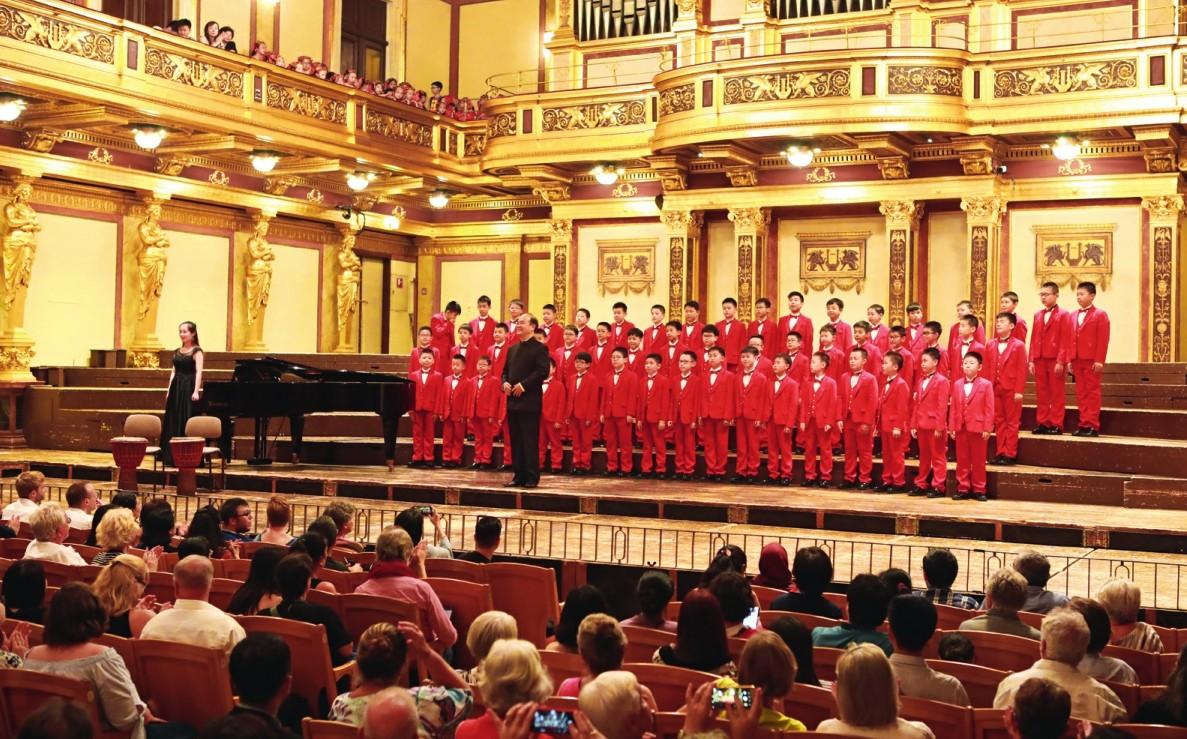Life Lessons in Children’s Choirs
By WU XUE
C HILDREN choirs not only train children how to sing but also nurture in them a collaborative spirit which benefits them for the rest of their life.
Their young voices harmonize gloriously and the happy faces of the Baby Snail Choir clearly show that they enjoy singing. Yet the group of children in the choir face a major challenge that belies their vocal ability. They were all born with severe hearing im- pairments. Even with cochlear implants, the world they hear is different from ours.
According to Li Yongqin, a teacher at Shanghai Rehabilitation Center for Deaf Children, the patients here have varying degrees of hearing loss after birth, some even cannot hear the sound of a plane taking off, which is at 120 decibels. With modern technology, no hearing aid can fully restore the sounds of the world. The sound heard through the artificial cochlear implant is noisy and disturbs the music melody. “Many children have trouble speaking. One can imagine how difficult it is to sing a complete song, especially in a choir,” said Li.
Joining Voices
Yuan Yueyun, deputy dean of the School of Social Education of the Shanghai Conservatory of Music, contacted these children by chance in late 2018, after being urged to do so by a teacher at the rehabilitation center. Yuan immediately decided to go ahead and sow the seeds of music in the hearts of these children.

Yuan gathered the suggestions of many musicians as to how to go about the unique teaching process, and finally selected a choir method combining several kinds of vocal music. On the one hand, children can listen, watch, and observe more when they are together; on the other hand, a choir can enhance children’s teamwork and endurance. More importantly, they can exercise their oral muscles to adjust pitch and timbre.“Learning to sing was not our original intention. The process of singing in a choir is exactly the process of cultivating children’s physical and mental health,” said Yuan.
After rigorous selection, Wen Kailan and Chen Hui were chosen as the choir teachers. Rehearsals officially began in early 2019.
“The first rehearsal, to be honest, was a bit frustrating. When I played one note, the children were singing indiscriminately,” recalled Chen Hui, adding that it took a whole class to just teach the pronunciation of the “Ah” sound. “All the children could only make one tone, and couldn’t understand what a rising and falling tone is,” said Chen.
She said teaching children who are hard of hearing is completely different from teaching college students, as she had to contend with many more interruptions. The only way to succeed was through repetition, using rising and lowering gestures for pronunciation guidance. For instance, some students are born with a good pitch, so it is not very difficult to start by imitating and practicing one or two tunes; while other children have less talent, and need much more encouragement to lay a solid vocal foundation.
During the past two years of learning music, the children have changed a lot. Statistics show that the total score of social adaptation of children in the senior grade of the rehabilitation center’s kindergarten averages 67.05 points, which is 17.05 points higher than the average of 50 points. Their level of social adaptability obviously is higher than their peers’.
Rehabilitation training for listening, breathing, and articulation in the choir is also quite effective. Li Wenchen (a pseudonym), who was transferred to the kindergarten’s junior grade, was born hard of hearing as were her parents and grandparents. The child’s ability to learn was significantly lower than that of her peers when she entered the kindergarten, and she lacked confidence. Her eyes were always evasive when talking to the teacher. After joining the choir she became more cheerful and confident than before, and was even able to lead the dancing team.
Yuan believes that for these “baby snails,” standing on the stage and daring to sing is a huge victory. The school will collate the teaching experience of the past two years and develop a curriculum and a set of matching teaching materials based on the actual situation of the children.
Connecting the World through Multilingualism
Compared with the small scale efforts of the Baby Snail Choir, the Fushan Foreign Language Primary School Choir, with a history of 25 years, is more pro- fessional and innovative.
Fushan Foreign Language Primary School is located in the Lujiazui Finance District, Shanghai. As a school that promotes education to break down language barriers, children sing songs in a variety of languages. The choir performed Veni Creator Spiritus in Latin at the Golden Hall of Vienna in 2019, which amazed the audience.
Although it is difficult to pronounce Latin, and the song has as many as six parts, the children sing it effortlessly. Qian Fang, the principal of the primary school, said that Fushan’s curriculum aims to cultivate multiculturalism and an international perspective. The objective of the choir is not only to help the children learn singing skills, but also help them understand the world’s multiculturalism in song.
“The choir has always adhered to the concept of multilingualism. We sing in Shanghai and Wu dialects as well as German, Spanish, and Hungarian languages,” said Qian, adding that the choir is like a bridge, connecting China and the world, spreading the essence of Chinese culture, and allowing students to deeply understand the changes in the world.
In 2016, the choir sang a Yunnan folk song in Vienna, using local tunes and dialects. During the 15-minute performance, the children sang with all their hearts. As soon as the singing was over, foreign counterparts asked them to reveal the secret to their vivid performance. “A French choir followed our performances in various venues to learn from us,”said Fang Ying, the head of the music teaching and research group at the primary school.
Having led the choir for 21 years, Fang has formed her own teaching style. She believes that the most important thing for group singing is harmony and unity. In Fushan, the choir has formed an echelon training model, which is divided into low, middle, and high chorus echelons according to the age of the students. The low grade chorus has no parts, and is mainly for sound uniformity and intonation practice. In grade three, it will gradually separate the treble and the bass. A few versatile singers with wide pitch and tone ranges will be selected, which can be randomly matched with multiple parts and positions.

The ability learned in a choir gives students more possibilities of personal development. A shy girl like Liu Lingxi, who spent three years in the choir, has become the backbone of the musical theater club in her junior high school. “The establishment of selfconfidence and the cultivation of a global perspective cannot be achieved by telling a dozen stories. It is important to feel the love for life and learning in the process of learning to sing,” said Fang.
Learning Manners First
The largest boys’ choir in Shanghai was founded by Liu Qingjiang, a researcher at the Minhang Institute of Education. In his educational philosophy, the choir has a particularly importance to boys’ education. The process of learning to be part of the choir is the process of growing up and learning to behave.
Liu was born in a small county in Chuzhou, Anhui Province, and liked singing since childhood. There was no TV at home. His father, who ran a small business, bought the family a radio. After school every day, Liu listened to children’s novels and famous Peking Opera plays on the radio. Because he had a good voice and loved to sing, Liu joined the school’s choir. But when asked to stand up to perform in front of an audience, he suffered stage fright. That situation continued until he reached the second grade of junior high school, when he became more confident and never looked back.
Liu participated in organizing his first children’s choir in March 2012. In September 2016, he formed the Minhang Boys’ Choir. The total number of choir members is 111, all of whom came from various primary schools in Minhang District.
Liu realized that a choir, like a sports team, needs daily practice to keep it at its best, and he believes that young people need to develop the core elements of their character and have an understanding of the ethical values of life before they can achieve any success in a choir.


